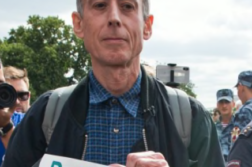BARIS RECOUNTED the nerves he felt standing next to numerous other men in his underwear, being measured and examined to determine his military eligibility. Military service is compulsory in Turkey, barring any serious medical issues.
“Do you have any problems?” asked a doctor on the medical board. Baris, assuming that the question was directed at his physical condition, correctly answered no. As a dancer and back-up singer to a popular Turkish performer, Baris (not his real name) is in peak condition. The board, feeling satisfied about his physical and mental suitability quickly announced he was eligible. Shaken by this, Baris announced that he needed to go to the psychiatrist to be cleared for being a homosexual man. He needed to get his “Pink Card,” the colloquial term for a medical discharge due to a “psychosexual disorder.” The medical examiner, annoyed by the brief confusion, asked why Baris hadn’t mentioned his “disorder” when he had been previously prompted. He was sent to another room for the administration of the Minnesota Multiphasic Personality Inventory, which was followed by a brief interview with a psychiatrist. His hospital visit was later used as evidence in front of the enlistment court that would make the final decision on his case.
Few countries’ identity is as intertwined as Turkey’s is with their own armed forces. In a country that was formed out of the ashes of the Ottoman Empire, and amidst a simultaneous invasion by its former Christian subjects, Turkey’s military is valued for its past glories and for carrying the mantle of the nation’s founder, Mustafa Kemal Ataturk. Since Ataturk won back Turkey’s present day territory, assumed control of the nation, and spearheaded a rapid modernization process, the military has been considered the vanguard of modernity, secularism, and of course, masculinity. A Turk, Ataturk asserted in his infamous 1920 speech the each Turkish youth has a born duty to be a solider. While the military may have imposed concepts of Western-style modernity in the past, its perception of gay men as being “rotten” (one of the military’s internal designations for medical discharges) has been an unwavering social norm.
Baris was lucky, however. His enlistment officer sent him to Kasimpasa Military Hospital. Kasimpasa’s medical staff eschews the normal procedure for a medical discharge. Had Baris been sent to Haydarpasa Student Hospital, he would have been subjected to an anal probe. Photographic evidence of Baris being anally penetrated would have been required. Actually, there’s no military ordinance that requires this procedure; its survival is a reflection of society’s disapproval of passive homosexuals. Unlike many of its Muslim neighbors, Turkey has no legal ban on homosexuality, and no requirement to justify its laws to any religion. Thus Turkey’s discriminatory practices, which are extra-legal, are powerfully demonstrated within other important national bureaucracies.
In May 2009, a gay scandal hit what some would consider the other religion of Turkey: soccer. Halil Ibrahim Dincdag was a soccer referee, a coveted job in Turkey. He submitted his military exemption report, a necessity to prove that he was neither presently affiliated with the military nor physically incapable of participation. Medical discharge reports do not provide the details of why someone was exempted, but the football federation drew its conclusion based on the fact that an able-bodied man had gotten a medical clearance. He was removed from his position and his first name and last initial were released to the media. He was almost immediately identified, prompting him to go on a nationally syndicated soccer show and come out as gay. Although this case actually brought needed coverage to workplace discrimination, the victim was comfortable enough to come out publicly and use the media as a tool for advocacy.
The circumstances are much different for most homosexual men. A young police officer was secretly outed to his superior officer in September 2007. After being interrogated, he agreed to resign. A resignation could allow him to work for the state in another capacity. He was terminated by the interior board of discipline for immoral conduct, despite the lack of proof of his sexual orientation, much less actual misconduct. This vague charge of violating moral decency is the legal fiction that allows anti-gay discrimination to persist in the work environment. He told his story to Lambda Istanbul, a GLBT organization that provides legal counseling to gay individuals under the condition that his identity be closely guarded. After two years and multiple appeals, the decision to terminate his employment was upheld. Worse still, the ex-police officer was forced to deny his sexuality throughout the appeals process and could not rely on family support.
Turkish courts don’t inspire confidence within the gay community that they will pursue justice on their behalf with the same vigor as for a heterosexual. Abdul Baki Kosar was a well-known gay journalist who was slain in his own home in February 2006. The judge accepted the murderer’s defense that he was unjustly provoked because of an alleged sexual advance by Abdul. While not acquitted, the murderer was sentenced to a significantly lighter penalty than normal (eighteen years instead of a life sentence).
The GLBT community knows that it cannot wait for society’s perceptions of gays to change in order to challenge bureaucratic discrimination. A recent court victory has confirmed that Turkish laws cannot legally endorse discrimination. A decision by Turkey’s Supreme Court Appeals overturned Lambda’s orders to cease operations. The holding that its charter violated public morality was deemed discriminatory by the appeals court. Lambda’s stated commitment to fighting for gay rights was not an illegal premise for an organization. However, an appeals court judge used ambiguous language that would allow for the future persecution of the organization by declaring it unlawful to encourage other people to be gay, which could be interpreted to include many of the normal activities of an advocacy organization, from issuing a press release to showing a gay film. Indeed, an Izmir-based organization, the Black Pink Triangle Association, is currently under investigation for the identical charge of violating the law protecting general and family morality.
Even with the dangerous wording of the appeals court decision, the Lambda case was a major moment for GLBT organizations. Nevertheless, most now believe that legislative advocacy is a more effective course than a judicial strategy. When Firat Soyle, Lambda Istanbul’s lawyer, was asked about what type of clarification is needed, he fired off his answer with the certainty that comes from having recited a similar answer in the past. “The 10th article of the constitution regulates equality before the law and forbids discrimination. Any kind of discrimination on the basis of race, ethnicity, or sex is forbidden. Sexual orientation and sexuality aren’t included, explicitly. They should be added. Some politicians say sex includes sexual orientation, but it’s ambiguous.”
In 2009, three parliamentary members, Sebahat Tuncel, Akin Birdal, and Mehmet Sevigen, posed questions to Prime Minister Recep Teyep Erdogan concerning possible proactive steps to combat antigay violence. During this year’s pride week, Mehmet Sevignen even spoke about hate crime legislation being introduced with the help of civil advocacy groups. Turkey’s currently ruling party, the Justice and Development Party (AKP), has staked a lot of its political capital on the improvement of minority rights, but this has mostly dealt with the Kurdish identity, wider acceptance of the uniqueness of the Alevi religion, and tackling such hot-button issues as establishing diplomatic relations with Armenia. The generally religious leanings of most of the AKP’s constituency has made it unlikely that gay rights will be added to their platform.
For outside observers, the hurdles that gay advocates face make immediate changes difficult to conceive. If the courts are not viable and the parliament has to cater to a socially conservative voting base, how do gay activists combat informal discrimination within Turkey’s bureaucracies? Those who are fighting for gay rights see the major progress of Turkish civil society as a sign that grassroots organizing will bring change. Lambda Istanbul is only sixteen years old, but they have already made major contributions to GLBT advocacy, including establishing a legal precedent for their existence.
Bora Bengisu, a Lambda Istanbul worker and graduate student, stressed that it’s important to remember the diversity of gays: “GLBT people are Kurds, Kemalists, Islamists, but there are still too many problems in Turkey for gays [to converge]on one issue.”When asked if this lack of immediate political unity could constitute a hurdle, Bora seemed optimistic. “The mere mention of Kurdish rights, Alevi rights, [rapprochement with]Armenia were unthinkable just ten years ago. Only recently have activist groups started to collaborate. Now we speak to Kurds, to Anarchists, women’s groups. It’s important to remember that these problems are connected. The problems of gays are tied to violence against women, to militarism, and to intolerance towards minorities.We should be fighting all these problems.” While Bora’s response still left many questions unanswered, it certainly indicated that there is no shortage of spirit amongst the small group of activists fighting against discrimination.




